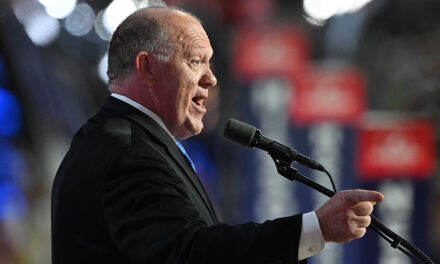We support our Publishers and Content Creators. You can view this story on their website by CLICKING HERE.
NewsGuard’s days are numbered: U.S. House takes bold stand against media bias
- The U.S. House of Representatives passed the National Defense Authorization Act (NDAA) for FY 2025, which includes provisions to curb government contracts with organizations accused of biased practices, notably targeting NewsGuard Technologies.
- NewsGuard, a self-proclaimed nonpartisan fact-checking organization, has faced criticism for allegedly targeting conservative and independent news outlets, leading to accusations of financial censorship and partisan bias.
- The NDAA’s prohibition on contracts with NewsGuard follows revelations that the U.S. Department of Defense funded the organization, raising concerns about government complicity in media censorship.
- The State Department’s Global Engagement Center (GEC), accused of similar censorship practices, is facing calls for termination, with the State Department recently notifying Congress of plans to shutter the agency.
- The NDAA’s passage and the proposed GEC closure represent significant steps in the fight against media censorship, emphasizing the importance of a free and unbiased press in safeguarding democracy.
In a decisive move to combat media bias and protect free speech, the U.S. House of Representatives has passed the National Defense Authorization Act (NDAA) for fiscal year 2025. The legislation, which garnered bipartisan support despite opposition from 124 Democrats, includes provisions aimed at curbing government contracts with organizations accused of biased practices, most notably NewsGuard Technologies. This landmark vote underscores the critical importance of a free and unbiased press in safeguarding liberty.
The NDAA’s passage marks a significant victory in the ongoing battle against censorship and financial blacklisting, particularly targeting media outlets that challenge the establishment narrative. NewsGuard, a self-proclaimed nonpartisan fact-checking organization, has come under fire for its alleged targeting of conservative and independent news sources. Critics argue that its ratings system disproportionately penalizes outlets such as Breitbart, The Drudge Report, and The Daily Mail, while shielding more mainstream sources from scrutiny.
Founded in 2018, NewsGuard claims to promote truth and reliability in journalism. However, its critics contend that its actions reveal a partisan agenda. The organization has been accused of advising advertisers to avoid certain websites, effectively stripping them of revenue and stifling dissenting voices. This practice, often referred to as financial censorship, has raised serious concerns about the erosion of free speech and the consolidation of media power in the hands of establishment-backed outlets.
The controversy surrounding NewsGuard intensified following revelations that the US Department of Defense (DOD) awarded the organization $749,387 in taxpayer funds in September 2021. This financial backing, combined with NewsGuard’s alleged targeting of conservative media, has fueled accusations of government complicity in media censorship. The NDAA’s prohibition on contracts with NewsGuard is a direct response to these concerns, signaling a commitment to ensuring a level playing field for all media voices.
Speaker of the House Mike Johnson praised the bill’s focus on accountability in government spending and its defense of free speech. Supporters believe the legislation sends a clear message that censorship will not be tolerated.
A free press is crucial to liberty
The fight against media censorship extends beyond NewsGuard. The State Department’s Global Engagement Center (GEC), another agency accused of targeting conservative media, is also facing scrutiny. The GEC, which was established in 2016 to combat foreign disinformation, has been criticized for its ties to the Global Disinformation Index, an organization that crafted a blacklist of conservative outlets and fed it to advertising companies. This practice, akin to NewsGuard’s financial blacklisting, has drawn bipartisan condemnation and led to calls for the GEC’s termination.
In a recent court filing, the State Department notified Congress of its plans to shutter the GEC, citing a loss of support from lawmakers. The move follows a series of investigations and lawsuits brought by conservative media outlets and lawmakers, including Rep. Darrell Issa (R-CA) and House Small Business Committee Chairman Roger Williams (R-TX). “The GEC is guilty of the highest crime an agency of its kind can commit: that it weaponized itself,” Issa said, emphasizing the agency’s role in censoring American citizens.
The NDAA’s passage and the proposed termination of the GEC represent a significant shift in the fight against media censorship. However, the battle is far from over. As long as organizations like NewsGuard continue to wield influence over media ratings and advertising practices, the threat to free speech will persist. It is imperative that lawmakers remain vigilant and continue to hold these entities accountable.
A free and unbiased press is the cornerstone of a healthy democracy. It serves as a watchdog against government overreach, holds powerful institutions accountable, and ensures that all voices, regardless of political affiliation, have the opportunity to be heard. The NDAA’s provisions targeting NewsGuard and the proposed termination of the GEC are critical steps in safeguarding this fundamental freedom. As the fight against censorship continues, it is essential that the principles of free speech and media independence remain at the forefront of the national conversation.
Sources include:

 Conservative
Conservative  Search
Search Trending
Trending Current News
Current News 





